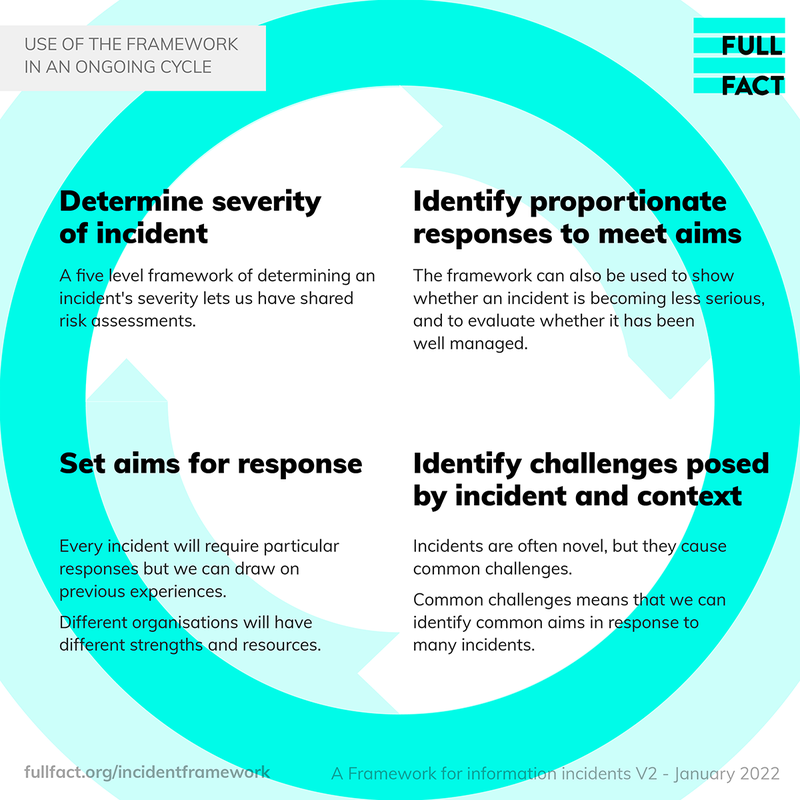Full Fact releases updated and improved framework to fight misinformation
Today Full Fact has published a revised version of the Framework for Information Incidents.
Since 2020, Full Fact has been working with internet companies, civil society and governments to create a new shared model to fight crises of misinformation. The Framework for Information Incidents is a tool to help different actors to identify incoming information crises and collaborate with others to respond effectively.
Join 72,953 people who trust us to check the facts
Sign up to get weekly updates on politics, immigration, health and more.
Subscribe to weekly email newsletters from Full Fact for updates on politics, immigration, health and more. Our fact checks are free to read but not to produce, so you will also get occasional emails about fundraising and other ways you can help. You can unsubscribe at any time. For more information about how we use your data see our Privacy Policy.
What is the Framework for Information Incidents?
The Framework is a practical tool and common reference to help those working to tackle misinformation and disinformation to identify incoming information crises and collaborate with others to respond effectively.
Key components of the Framework include: five levels of severity, eight common challenges that occur across different incidents, and twelve aims which users can work towards collaboratively.
In this iteration, we have introduced a five step process for using the Framework, as well as template spreadsheets to aid collaboration among or between teams, to make it easier to identify and respond to information crises proportionately and effectively.

Who is the Framework for Information Incidents for?
The Framework is to be used on a voluntary and open basis, supporting collaboration between counter-misinformation actors from the technology sector, government, civil society, official information provision, the media, and others.
It is intended to help decision-makers understand, respond to and mitigate information crises in proportionate and effective ways. Meanwhile, for those working to respond to information incidents on the front line, the Framework enables more effective and meaningful collaboration, for example sharing information during and in the run up to incidents, joint planning and evaluation, or increased sharing of capacity and resources.
What is an information incident?
An information incident is a cluster or proliferation of inaccurate or misleading claims or narratives, which relates to or affects perceptions of or behaviour towards a certain event or topic happening online or offline. This can occur suddenly, or have a slow onset.
Certain events (for example terrorist attacks, elections, or the current pandemic we’re in) are likely to trigger information incidents, and to have a substantial and material impact on the people, organisations, and systems that consume, process, share or act on information – toward good, neutral or bad outcomes. These are listed below.
An unexpected incident like a terrorist attack is likely to lead to an increased demand for information and news, but there is often a gap before information is confirmed which may lead to a surge in false information or conspiracy theories. An election might spur polarisation or prompt high profile false claims from figures in authority who are usually trusted by mainstream audiences. In both these scenarios, the baseline information environment shifts: information might be complex, incomplete, or consumed or shared in new ways.
What’s changed in this iteration?
Following consultation and feedback in 2021, we have revised the Framework. Version 2 includes:
- Clearer severity indicators for determining and moving between the five levels
- More flexible aims corresponding to the different challenges that users of the Framework might experience during an information incident
- Enriching the list of suggested responses to choose from for response plans, linking these to relevant actors and having suggestions for how to respond that work over both long and short-term periods
- Introducing new template tools for organisations using the Framework collaboratively during incidents or to prepare for future incidents
The Framework is designed to be flexible for different situations and users, and adaptable to the ever-shifting nature of misinformation and disinformation.
How to use the Framework or get involved
The Framework for Information Incidents is designed to be flexible and adaptable. We have deliberately developed it in an open way, publishing our thinking in discussion documents and seeking feedback as we go.
There are a few ways of getting involved in improving, testing and implementing the Framework:
- Provide feedback: You can provide feedback on any aspect of the Framework using the box below. Please refer to page numbers or titles where possible, and leave your contact details so we can contact you for clarification or follow up.
- Organise training in using the Framework for your organisation: We are able to deliver interactive training which introduces the concept of information incidents, the Framework’s components, and using it in practice including simulation exercises.
- Test the Framework: We are keen for others to try using the Framework either as part of planning and preparation exercises, or during information incidents.
- Work with us to adapt the Framework to suit your context: We are keen to collaborate with other organisations to adapt the Framework components and training materials for different countries and/or sectors.
Please get in touch if you would like to use or adapt the Framework for your own organisation, or have a proposal for a joint project to develop any aspect of this work.